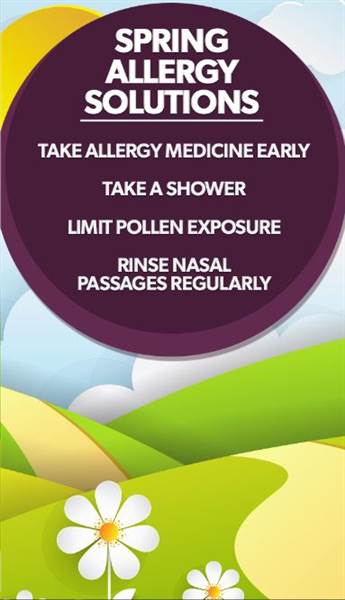Today Interviews Dr. Dvorin on Allergies, Pollen & Diet

April 5, 2017
As published on Today.com by Linda Carroll
The early spring may have cheered us with flowers blooming sooner than usual, but it’s also bringing a whopping dose of pollen.
“In a large chunk of the U.S., from Texas to New York, spring arrived two to three weeks earlier than normal,” says Dr. Donald Dvorin, a specialist with the Asthma Center in Philadelphia, citing data from the U.S. Geological Survey and the National Phenology Network.
“We saw one of our peak pollen counts from juniper pollen, which came out a month earlier than usual on February 27th. Grass pollen also came out early this year in the last week of March.”
While we can’t control how much pollen is in the outside air, there are ways to mitigate its effect, experts say. For some people, that will mean cutting back on foods that boost the symptoms associated with certain pollens. For others, it will mean avoiding exposure, and yet others will turn to medications and other therapies to stem symptoms like sneezing and runny noses.
Even with the best planning, it’s probably going to be a tough season for allergy sufferers, experts say.
“The traditional weather patterns as we know them — winter, spring, summer and fall — and the allergy seasons tied to them seem to be changing,” says Dr. Merritt Fajt, an assistant professor of medicine in the division of pulmonary allergy and critical care medicine at the University of Pittsburgh Medical Center.
“The lines between them are becoming blurred and there is the potential that people who used to have seasonal allergies will have one long allergy season.”

For city dwellers, there’s a double whammy, says Dr. Jeffrey G. Demain, a clinical professor at the University of Washington and director of the Allergy, Asthma and Immunology Center of Alaska.
Along with those earlier bloom times, there’s the impact of climbing carbon dioxide levels. “Plants like carbon dioxide,” Demain says. “When carbon dioxide levels are high, you get a longer pollen season, one that starts earlier and lasts longer overall.”
No breaks
Making matters worse, it seems like there’s always some plant pollinating.
“What’s really a problem for patients is they’re not getting a break,” Demain said. “By the time we cycle through tree pollens, the grass has already begun.”
It’s not just the plant pollen that’s getting pumped up by changing weather conditions. “Mold spore levels have been higher because we are not getting as cold winters,” Dvorin says. Mold levels also are increasing, Demain says. “They spike in the spring and fall.”
Is your diet making it worse?
Making matters worse for some folks is the interaction between pollen allergies and foods. “Some individuals with pollen allergies can develop symptoms around the mouth and throat immediately after eating raw fresh fruits, vegetables, nuts or seeds that contain proteins that are cross reactive to the pollens,” Dvorin says. “This is known as oral-allergy syndrome or pollen-food syndrome.”
The solution? Cook fruits, nuts and vegetables when your allergies are at their worst, Dvorin says.
For all other allergy symptoms, experts advise:
- Start taking allergy medications two weeks before you expect symptoms to begin, Dvorin says.
- Change your clothes when you come indoors. That way, you won’t be carrying pollen around with you, Demain says.
- If you can, schedule outdoor activities during the afternoon since pollen levels tend to spike in the morning, Demain says.
- Whenever possible, take a shower and wash your hair after working or playing outdoors, Dvorin says.
- Keep windows closed during pollen season. “A lot of people like to sleep with the windows open at night,” Fajt says. “But pollen can blow in and cover surfaces in your home, even if you have screens in the window, since some pollen sizes are very small.”
- Rinse your nasal passages regularly with a salt and water solution, Dvorin says. It “decreases inflammation in the sinuses,” he explains.












